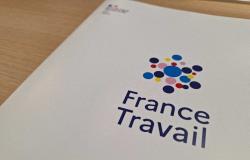2025 will be without Weight Watchers in France. The American company offering food programs for weight loss ceased these activities in France at the end of 2024. Born in 1963, it is one of the pioneers in this field, based on a principle of meetings and communities to help each other. She has made many followers, like Françoise, from the Territoire de Belfort, who did “the Weight Watchers diet twice after pregnancies” and lost “20 kilos each time”. Françoise also, from Lons-le-Saunier (Jura), tested “the program four times with a facilitator, which allowed me to lose weight which I then gained back because I stopped maintaining the good habits.”
The “boom” of anti-obesity drugs
A success that eventually faded. “The brand had repositioned itself, had erased the diet part to talk instead about food rebalancing, counting points, there was a well-being dimension,” analyzes Clémentine Hugol-Gential, university professor of information sciences and communication at the University of Burgundy, specializing in food communication. That's not enough, the brand's turnover is plummeting, as is its stock price.
Oprah Winfrey, famous American television host, who joined the board of directors of Weight Watchers in 2015 and helped relaunch the brand, did not run for re-election in 2024. She seems to have changed her strategy to lose weight, since she revealed that she had lost tens of kilos in a few months thanks to… Ozempic, a prescription drug intended primarily for patients with type 2 diabetes, diverted as a weight-loss drug.
“There is a groundswell that is coming very strongly, it is the promotion via social networks of semaglutides, in particular Ozempic and Wegowy,” notes Clémentine Hugol-Gential. The use of these anti-obesity drugs, indicated within the framework of monitoring by professionals, is regularly diverted to lose weight on Instagram or TikTok. “These drugs raise a global question about how weight loss is considered today,” worries the specialist.
The role of social networks
It is therefore difficult to see the era of diets disappearing in the face of the decline of Weight Watchers. Added to this is the dimension of social networks and the promotion of all kinds of “miracle” diets and products to lose weight. “Influencers quickly grasped the way of talking about food with an embodied well-being dimension, we share our sports routine, our meals. We also see spectacular weight loss transformations in a few months,” notes the professor. Even if we also find a pocket of resistance on social networks with messages to fight against fatphobia and advocate body acceptance, these movements remain on the margins.
Thinness remains advocated by society and is an important financial issue. “The diet market is not experiencing a crisis, we see this with the billion-dollar boom in anti-obesity drugs and the financial stakes behind it,” laments Clémentine Hugol-Gential. The problem seems to have shifted: misuse of these medications, promotion of miracle “products” or “programs” that are nevertheless dangerous for health, diets are still not out of fashion.
“In the nutrition sector, there are a lot of fake professionals”
Cécile Bétry, doctor, researcher and professor of nutrition at Grenoble-Alpes University Hospital, reminds us that there is no miracle solution for losing weight.
How do you analyze the end of Weight Watchers in France?
“We can hope that the withdrawal of Weight Watchers (WW) in France signals the end of these low-calorie diet proposals which we know do not work. An Anses report published a few years ago demonstrated that after these diets like WW, Dukan or others, 95% of the time there is a weight regain. We have known for some time now that these diets are at best ineffective, and at worst harmful because they have health consequences. »
“We can hope that a section of Weight Watchers followers will turn to health professionals”
Is this a sign of a change in our society regarding diets?
“We can hope that a segment of Weight Watchers followers will turn to health professionals, but other ideas and products have taken precedence over WW and these food programs, particularly on social networks. Influencers offer all kinds of miracle and quick solutions, perhaps more attractive, but which are not based on any scientific facts and are above all dangerous for your health. There is still a large part of the population who are on this quest to lose weight and who are ready to do anything and everything for it. But social networks are also a way for health professionals to communicate on this subject and establish the truth. In the nutrition sector there is a lot of quackery and fake professionals, for example we are subject to many people who may call themselves a nutritionist because it is not a protected term. »
Why is weight loss still a hot and very lucrative topic?
“Because we are still in this quest for a miracle solution to a much more complex problem, there is still a lot of pressure from society on the bodies of women and also of men today, there is a desire to lose weight to look like beauty standards and because we still think we can control our food intake.
There is still a lot of popularization work to explain that weight is not only under the control of will, the problems of overweight and obesity are complex and multifactorial, there is a need for global care. by professionals to identify weight gain. And then among the people who diet, there are many who are not overweight or obese, we must try to understand why and support them, work on accepting their body and provide education. to health. »
France






